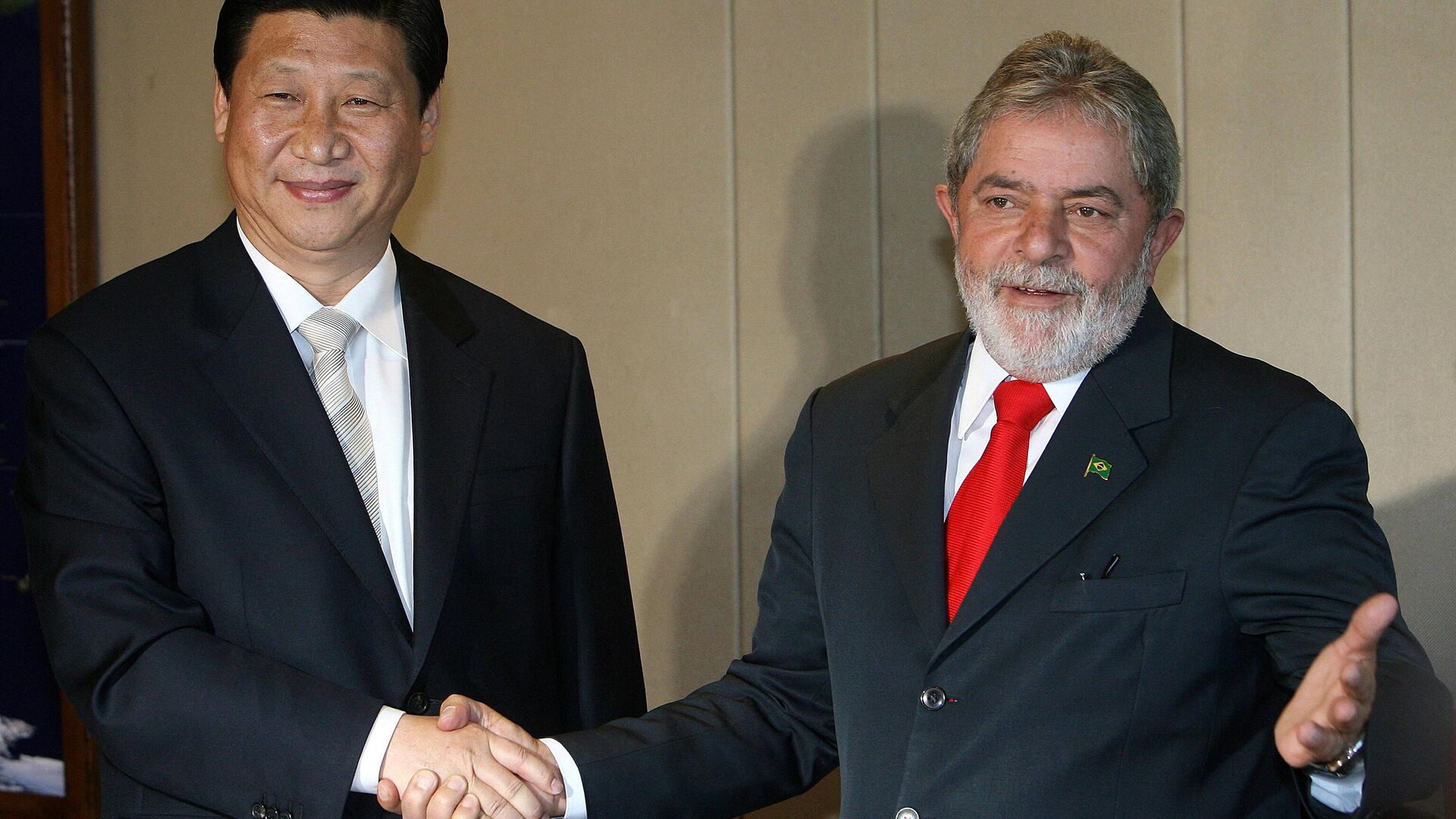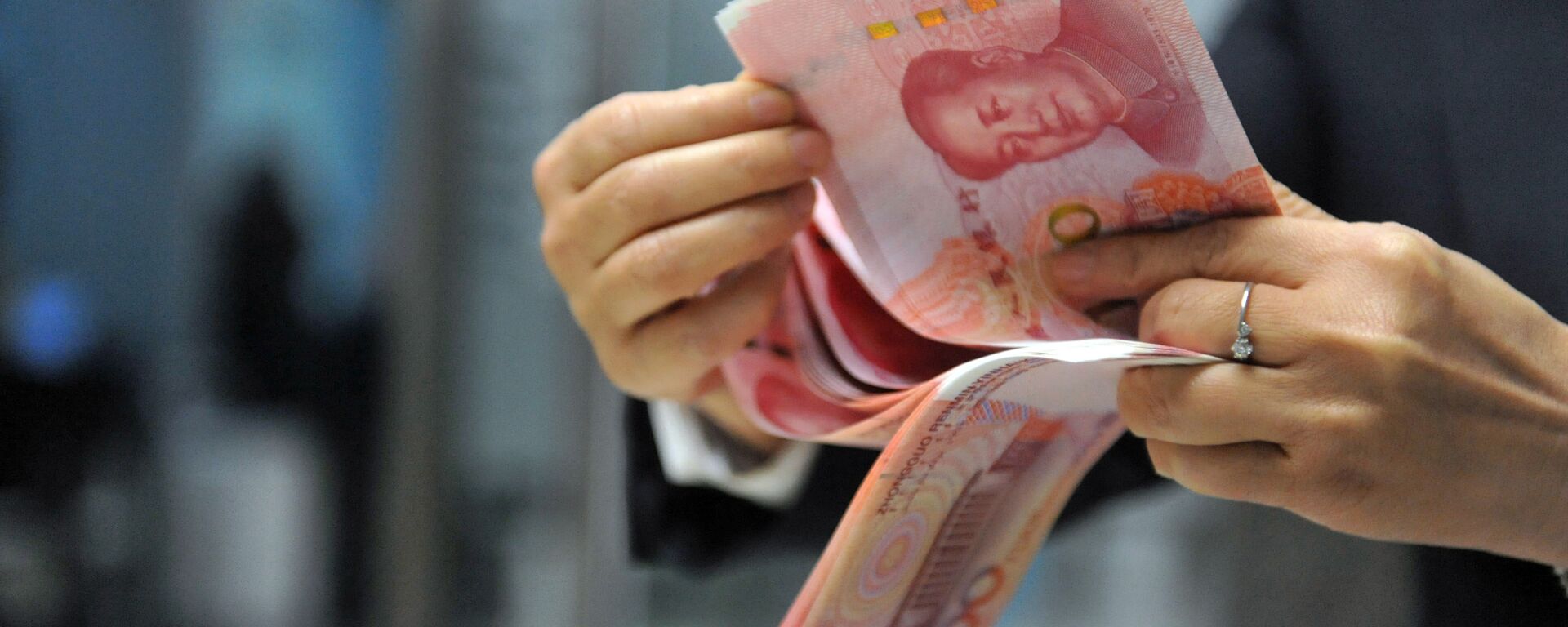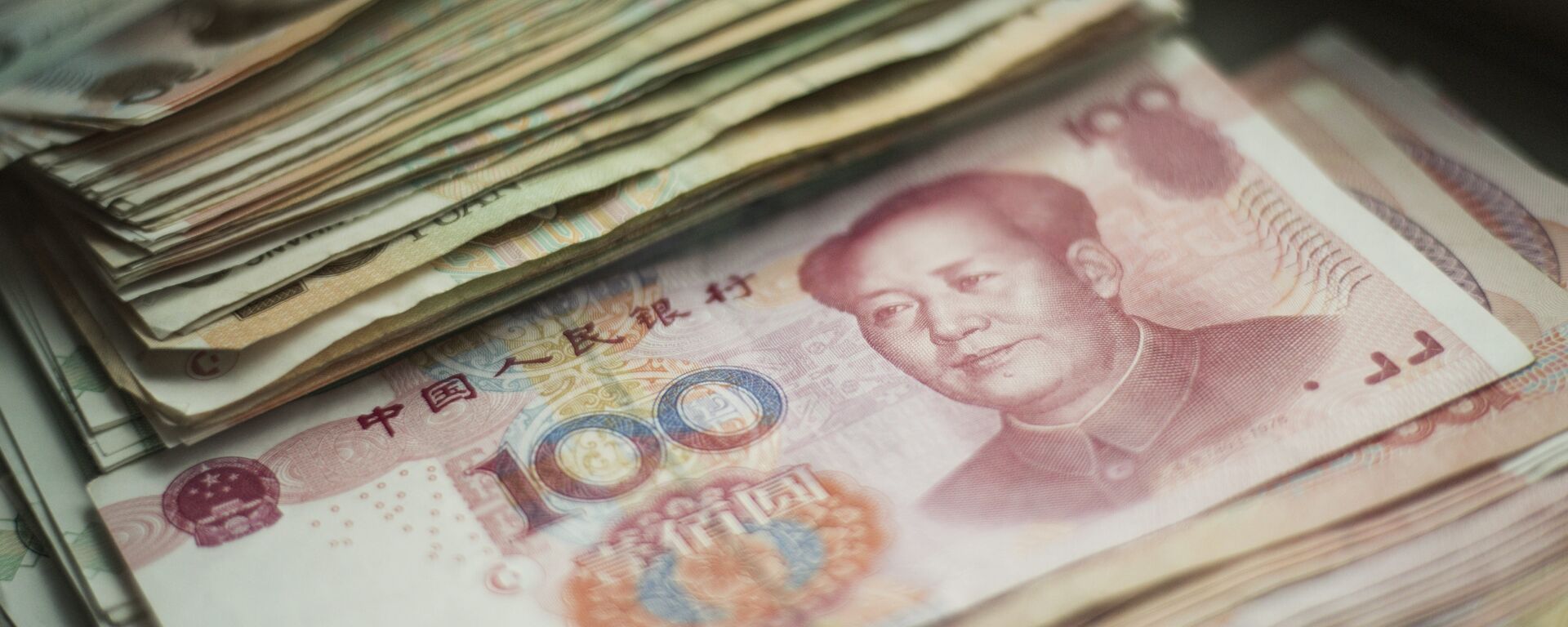https://sputnikglobe.com/20230411/trade--geopolitics-what-to-expect-from-visit-of-brazils-president-lula-to-china--1109339362.html
Trade & Geopolitics: What to Expect From Lula's China Tour
Trade & Geopolitics: What to Expect From Lula's China Tour
Sputnik International
What to expect from visit of Brazil’s President Lula to China.
2023-04-11T07:42+0000
2023-04-11T07:42+0000
2023-04-11T09:18+0000
china
brazil
lula da silva
xi jinping
world
jair bolsonaro
ukraine crisis
https://cdn1.img.sputnikglobe.com/img/07e7/04/0b/1109339048_0:160:3072:1888_1920x0_80_0_0_ec471f3f754fcce3dbb77c154ffcaeea.jpg
Brazilian President Luiz Inacio Lula da Silva is gearing up to "consolidate" his country’s relationship with China.Speaking ahead of his visit, which had previously been called off due to the 77-year-old president’s bout of pneumonia, da Silva weighed in on his upcoming meeting with his Chinese counterpart, Xi Jinping.Here is a look at what to expect from the four-day trip of Brazil’s leader to China.Brazilian President Luiz Inácio Lula da Silva, also simply known as "Lula," was originally scheduled to visit China on March 25-30. After recovering from a reportedly mild case of pneumonia, the Brazilian leader, who took over from his predecessor, Jair Bolsonaro, just slightly over three months ago, is in a flurry of diplomatic activity. He previously visited Argentina in late January to "rebuild bridges", and the United States in February to "kick-start a new era of relations."Lula will arrive in Shanghai first on Tuesday, after which he is scheduled to travel to Beijing. His meeting with China's President, Xi Jinping, is set for April 14. Da Silva will also Chinese Prime Minister Li Qiang next Friday. Lula's itinerary also includes meetings with business leaders and a visit to the headquarters of the New Development Bank (NDB) in Shanghai. The NDB is an international financial institution established in 2014 following the BRICS summit by an agreement between Brazil, Russia, India, China and South Africa.The bank seeks to mobilize resources for infrastructure and sustainable development projects in BRICS countries, which comprise Russia, Brazil, China, India, and South Africa, as well as other emerging markets and developing countries.Before Lula's trip was delayed, it was set to comprise a delegation numbering 240 business representatives, with the agricultural sector represented by 90 of them, according to media reports citing the presidential palace. Furthermore, the Brazilian president would have two representatives from all government ministries, and 27 senators and congressmen. After the rescheduling of the trip, Brazil announced that an additional 12 legislative members, including head of the Brazilian Senate Rodrigo Pacheco, would join the entourage.Luiz Inácio Lula da Silva, who is in his third presidential term, previously visited Beijing twice - in 2004 and 2009 - during his time in office. He met at the time with then-Chinese President Hu Jintao eight times. 'New Jobs & New Productive Assets'The 39th Brazilian president's stance towards China is a far cry from the isolationist policies espoused by Jair Bolsonaro. A member of the Workers' Party, Lula stated ahead of the trip:At least 20 deals are expected to be signed between Brazil and China in such areas as finance, industry, agriculture, health, education, science and technology, according to media reports.Commerce figures show that China has been Brazil’s top trading partner for at least 14 years, with trade between the two growing by 8.1% in 2022, hitting US$171.5 billion. According to the Chinese Ministry of Commerce, Latin America's largest economy is China’s biggest supplier of soybeans, chicken and sugar, along with significant exports of corn and beef.The South American country secured 13.6% of China’s foreign direct investment in 2021, predominantly for projects linked to the electricity grid, and oil extraction. Furthermore, the visit comes after the two countries unveiled a deal for trade between them to be settled in their local currencies. The announcement to displace the dollar was made at a high-level China-Brazil business forum in Beijing on March 29 in the wake of the current international financial crisis. The transition was seen as promoting the development of China-Brazil cooperation in food and minerals, while also opening up new opportunities for the export of high value-added goods from China to Brazil and from Brazil to China.Reviving Brazil's Diplomatic CloutOf course, besides trade, geopolitics will also top the visit's agenda. When Luiz Inácio Lula da Silva took office after Bolsonaro, he vowed he would reinvigorate Brazil’s international clout, hoping to position his country as a successful mediator. During his earlier stints as president, Lula was involved in talks with US presidents and senior Iranian officials, advocating for peace. In 2020, when Bolsonaro was President of Brazil, Lula slammed his "warmongering ideology and a shameful subservience to the current US president," in a reference to Donald Trump's order to assassinate Qassem Soleimani, commander of the Islamic Revolutionary Guard Corps’ elite Quds Force, using drone bombs, and then sparking an ensuing security crisis. Hence, now, the flurry of diplomatic visits from the current Brazilian leader.Lula, who has faulted Washington for "unilateralism", embracing, instead, the notion of a multipolar global order, pledged to "have relations with everyone." Brazil is holding its own now in such regional forums as the Community of Latin American and Caribbean States, the Union of South American Nations, and the Mercosur trade bloc.Now, the Ukraine conflagration will be at the center of discussions between the Brazilian president and his Chinese counterpart. Lula da Silva and Xi Jingping "will talk about the war in Ukraine," Foreign Minister Mauro Vieira told reporters ahead of the trip. He added that after Lula's foray into China, a group of mediator states will have been "created."The Brazilian head of state, who refused to join the so-called collective West, spearheaded by Washington, in delivering weapons to the Kiev regime, stated in February that he wanted to discuss a truce not only with Russia, but also with the US, China, India, Indonesia and other countries. China proposed a 12-step resolution to the Ukraine conflict in a plan discussed during Xi Jinping's visit to Russia to meet with President Vladimir Putin in March. Beijing's proposal was assessed as "very positive" by Vieira. The Kremlin has repeatedly underscored its readiness to negotiate, while the authorities in Kiev have ruled out any talks as long as Vladimir Putin remains President of Russia.
https://sputnikglobe.com/20230330/china-brazil-strike-blow-against-dollar-through-bilateral-trade-1108959507.html
https://sputnikglobe.com/20230330/brazil-china-sign-agreement-to-trade-in-yuan-1108944998.html
china
brazil
Sputnik International
feedback@sputniknews.com
+74956456601
MIA „Rossiya Segodnya“
2023
News
en_EN
Sputnik International
feedback@sputniknews.com
+74956456601
MIA „Rossiya Segodnya“
Sputnik International
feedback@sputniknews.com
+74956456601
MIA „Rossiya Segodnya“
brazil’s president, luiz inacio lula da silva, lula, visit to china, meeting with chinese president, xi jinping, trade turnover, geopolotics, brazil’s top trading partner, ukraine crisis, china's 12-step resolution to ukraine conflict
brazil’s president, luiz inacio lula da silva, lula, visit to china, meeting with chinese president, xi jinping, trade turnover, geopolotics, brazil’s top trading partner, ukraine crisis, china's 12-step resolution to ukraine conflict
Trade & Geopolitics: What to Expect From Lula's China Tour
07:42 GMT 11.04.2023 (Updated: 09:18 GMT 11.04.2023) President Luiz Inacio Lula da Silva of Brazil, 77, was earlier forced to put off his visit to China owing to a bout of “bacterial and viral bronchopneumonia due to influenza A”, according to an official statement from his presidential office. Chinese authorities were informed of the Brazilian leader's desire to reschedule his trip.
Brazilian President Luiz Inacio Lula da Silva is gearing up to "consolidate" his country’s
relationship with China.
Speaking ahead of his visit, which had previously been called off due to the 77-year-old president’s bout of pneumonia, da Silva weighed in on his upcoming meeting with his Chinese counterpart, Xi Jinping.
"I am going to invite Xi Jinping to come to Brazil, for a bilateral meeting, to get to know Brazil, to show him the projects that we have of interest for Chinese investment," Luiz Inacio Lula da Silva said in an interview to state-owned broadcasting company EBC.
Here is a look at what to expect from the four-day trip of Brazil’s leader to China.
Brazilian President Luiz Inácio Lula da Silva, also simply known as "Lula," was originally scheduled to visit China on March 25-30. After recovering from a reportedly mild case of pneumonia, the Brazilian leader, who took over from his predecessor, Jair Bolsonaro, just slightly over three months ago, is in a flurry of diplomatic activity. He previously
visited Argentina in late January to "rebuild bridges", and the United States in February to "kick-start a new era of relations."
Lula will arrive in Shanghai first on Tuesday, after which he is scheduled to travel to Beijing. His meeting with China's President, Xi Jinping, is set for April 14. Da Silva will also Chinese Prime Minister Li Qiang next Friday. Lula's itinerary also includes meetings with business leaders and a visit to the headquarters of the
New Development Bank (NDB) in Shanghai. The NDB is an international financial institution established in 2014 following the BRICS summit by an agreement between Brazil, Russia, India, China and South Africa.
The bank seeks to mobilize resources for infrastructure and sustainable development projects in BRICS countries, which comprise Russia, Brazil, China, India, and South Africa, as well as other emerging markets and developing countries.
Before Lula's trip was delayed, it was set to comprise a delegation numbering 240 business representatives, with the agricultural sector represented by 90 of them, according to media reports citing the presidential palace. Furthermore, the Brazilian president would have two representatives from all government ministries, and 27 senators and congressmen. After the rescheduling of the trip, Brazil announced that an additional 12 legislative members, including head of the Brazilian Senate Rodrigo Pacheco, would join the entourage.
Luiz Inácio Lula da Silva, who is in his third presidential term, previously visited Beijing twice - in 2004 and 2009 - during his time in office. He met at the time with then-Chinese President Hu Jintao eight times.
'New Jobs & New Productive Assets'
The 39th Brazilian president's stance towards China is a far cry from the isolationist policies espoused by Jair Bolsonaro. A member of the Workers' Party, Lula stated ahead of the trip:
"What we want is for the Chinese to make investments to generate new jobs and generate new productive assets in Brazil."
At least 20 deals are expected to be signed between Brazil and China in such areas as finance, industry, agriculture, health, education, science and technology, according to media reports.
Commerce figures show that China has been Brazil’s top trading partner for at least 14 years, with trade between the two growing by 8.1% in 2022, hitting US$171.5 billion. According to the Chinese Ministry of Commerce, Latin America's largest economy is China’s biggest supplier of soybeans, chicken and sugar, along with significant exports of corn and beef.
The South American country secured 13.6% of China’s foreign direct investment in 2021, predominantly for projects linked to the electricity grid, and oil extraction.
Furthermore, the visit comes after the two countries unveiled a deal for trade between them to be
settled in their local currencies. The announcement to displace the dollar was made at a high-level China-Brazil business forum in Beijing on March 29 in the wake of the current international financial crisis. The transition was seen as promoting the development of China-Brazil cooperation in food and minerals, while also opening up new opportunities for the export of high value-added goods from China to Brazil and from Brazil to China.
Reviving Brazil's Diplomatic Clout
Of course, besides trade, geopolitics will also top the visit's agenda. When Luiz Inácio Lula da Silva took office after Bolsonaro, he vowed he would reinvigorate Brazil’s international clout, hoping to position his country as a successful mediator. During his earlier stints as president, Lula was involved in talks with US presidents and senior Iranian officials, advocating for peace. In 2020, when Bolsonaro was President of Brazil, Lula slammed his "
warmongering ideology and a shameful subservience to the current US president," in a reference to Donald Trump's order
to assassinate Qassem Soleimani, commander of the Islamic Revolutionary Guard Corps’ elite Quds Force
, using drone bombs, and then sparking an ensuing security crisis.
Hence, now, the flurry of diplomatic visits from the current Brazilian leader.
Lula, who has faulted Washington for "unilateralism", embracing, instead, the notion of a
multipolar global order, pledged to "have relations with everyone." Brazil is holding its own now in such regional forums as the Community of Latin American and Caribbean States, the Union of South American Nations, and the Mercosur trade bloc.
Now, the
Ukraine conflagration will be at the center of discussions between the Brazilian president and his Chinese counterpart.
Lula da Silva and Xi Jingping "will talk about the war in Ukraine," Foreign Minister Mauro Vieira told reporters ahead of the trip. He added that after Lula's foray into China, a group of mediator states will have been "created."
The Brazilian head of state, who refused to join the so-called collective West, spearheaded by Washington, in
delivering weapons to the Kiev regime, stated in February that he wanted to discuss a truce not only with Russia, but also with the US, China, India, Indonesia and other countries. China proposed a 12-step resolution to the Ukraine conflict
in a plan discussed during Xi Jinping's visit to Russia to meet with President Vladimir Putin in March. Beijing's proposal was assessed as "very positive" by Vieira. The Kremlin has repeatedly underscored
its readiness to negotiate, while the authorities in Kiev have ruled out any talks as long as Vladimir Putin remains President of Russia.




